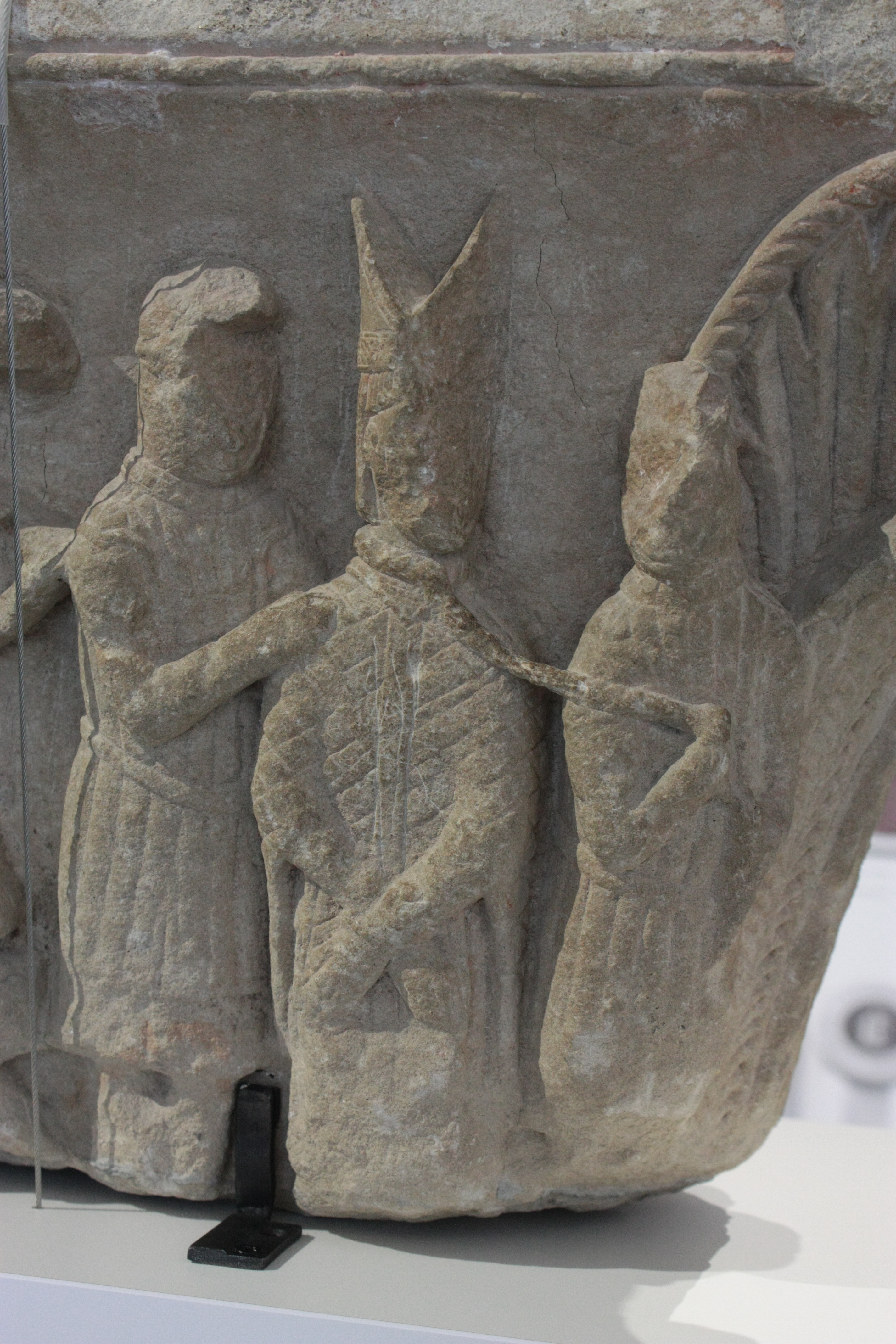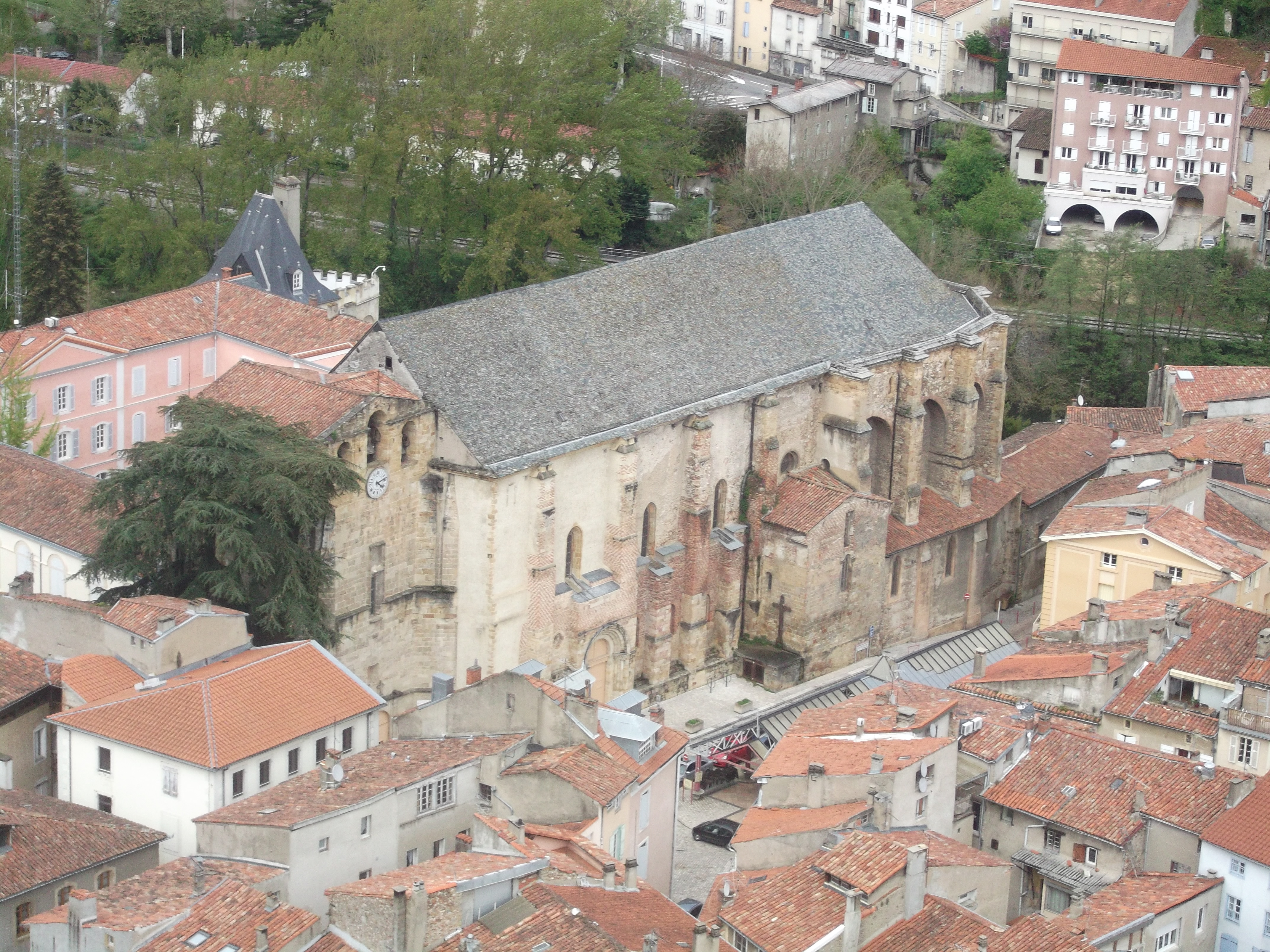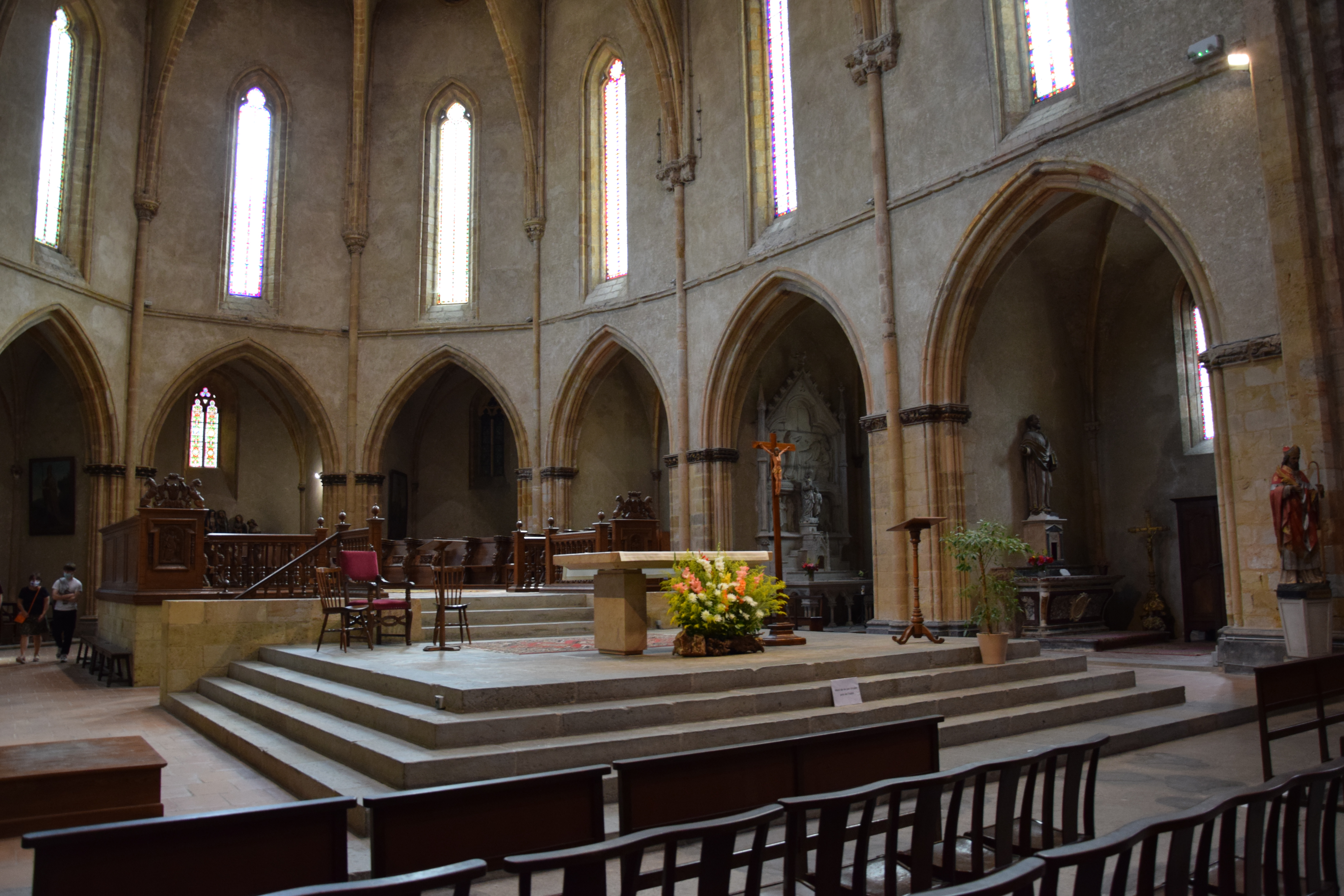Martyre
de Volusien sur un chapiteau roman du xiie siècle (musée
du château de Foix, Ariège).
Martirio
di San Volusiano di Tours in un capitello
romanico del XII secolo. Museo del Castello di Foix (Ariège).
Saint Volusien
Évêque de Tours (+
v. 498)
Sénateur de Tours, il avait épousé une femme difficile envers qui il usa de beaucoup de patience. Élu évêque de la cité de saint Martin, il fut fait prisonnier par les Goths, alors adeptes de l'arianisme, et fut exilé près de Toulouse.
Évêque de Tours, il était originaire de l'Auvergne. Nous ignorons les circonstances qui le firent venir sur les bords de la Loire, mais sa présence avait été remarquée par les tourangeaux qui le choisirent pour évêque en 491. Comprenant que la conversion récente de Clovis à l'Église catholique était redoutable pour son autorité dans son royaume, Alaric, roi des Goths, très attaché à l'arianisme et dont l'autorité s'étendait sur la Touraine, fit exiler saint Volusien à Toulouse. Chassés par les troupes victorieuses de Clovis, les Goths se replièrent sur l'Espagne, emmenant avec eux saint Volusien. Aux environs de Pamiers, dans l'Ariège, ils s'en débarrassèrent en lui tranchant la tête.
"Volusien naquit chez les Arvernes, en Gaule, d'une famille sénatoriale. Homme d'une grande sainteté et piété, il était riche. Doté de vertus et de dons spirituels, il fut le septième évêque de Tours et succéda à saint Perpet, son proche parent. Il dépensait avec grande charité toutes ses ressources pour le bien de l'Église et la nourriture des pauvres.
À cette époque-là, les Goths étaient partout en Aquitaine et jusqu'aux contrées de la Loire. Leurs mœurs barbares et l'hérésie arienne à laquelle ils appartenaient, troublaient la paix et la tranquillité.
Malgré les exigences des Goths, le saint homme ne cessa pas un instant de s'opposer à leur impiété et inlassablement écarta les ouailles de son troupeau des pâturages infectés d'hérésie, à tel point qu'il fut exilé à Toulouse, alors capitale d'Alaric, roi des Goths.
Après la victoire de Clovis, roi des Francs, près de Poitiers, qui tua Alaric de ses propres mains et poursuivit les Goths jusqu'à Toulouse, saint Volusien, qui souffrait beaucoup, fut emmené par les Goths vers l'Espagne.
Le saint homme, en chemin, n'hésitait pas à leur reprocher leur impiété ce qui lui valut la noble couronne de martyre. Cela se passait dans le pays de Foix, en un lieu encore appelé 'Couronne' et, plus tard, Castrum de Saint Volusien, en l'an 507. Son corps, retrouvé sur sa propre révélation, fut miraculeusement transporté par les habitants jusqu'à Foix où ils le déposèrent dans la basilique des saints Nazaire et Celse. Volusien devint le patron de cette église. Beaucoup de miracles furent opérés sur le tombeau du martyr. En 1111, son corps fut transféré de l'ancienne à la nouvelle basilique, consacrée au martyr." (diocèse de Pamiers)
Saint Volusien évêque 494-498. (historique - diocèse de Tours)
- vidéo: L'abbatiale Saint Volusien de Foix (webTV de la CEF)
Près de Foix en Gaule Narbonnaise, vers 498, le trépas de saint Volusien,
évêque de Tours, chassé par les Goths et mort en exil.
Martyrologe romain
SOURCE : https://nominis.cef.fr/contenus/saint/5258/Saint-Volusien.html
Chapiteau
historié, scène de bataille évoquant la légende de Saint Volusien, évêque de
Tours. Pierre calcaire sculptée, Fin du XIIe siècle. Inv. 989-1-77. Musée
départemental de l'Ariège.
Also
known as
Volusianus
Profile
As a layman,
he suffered through years of a terrible marriage.
Imperial Roman senator at Tours, France. Bishop of Tours in 488. Exiled to Spain in 496 by Arian Visigoths.
May have been martyred,
but records are unclear.
>18
January 496 at Toulouse, France
Additional
Information
Book
of Saints, by the Monks of
Ramsgate
Roman
Martyrology, 1914 edition
Saints
of the Day, by Katherine Rabenstein
books
Our Sunday Visitor’s Encyclopedia of Saints
other
sites in english
sitios
en español
Martirologio Romano, 2001 edición
fonti
in italiano
MLA
Citation
“Saint Volusian of
Tours“. CatholicSaints.Info. 3 May 2022. Web. 16 January 2023. <https://catholicsaints.info/saint-volusian-of-tours/>
SOURCE : https://catholicsaints.info/saint-volusian-of-tours/
Article
(Saint) Bishop (January
18) (5th
century) An Archbishop of Tours who
was cast into a dungeon by the Arian Visi-Goths,
and died a prisoner at
Toulouse, about A.D. 500,
in the seventh year of his Episcopate.
MLA
Citation
Monks of Ramsgate.
“Volusian”. Book of Saints, 1921. CatholicSaints.Info.
29 December 2016. Web. 16 January 2023.
<https://catholicsaints.info/book-of-saints-volusian/>
SOURCE : https://catholicsaints.info/book-of-saints-volusian/
Saints
of the Day – Volusian of Tours, Bishop, Martyr
Article
Died in Toulouse, France,
496. Saint Volusian was a senator of Tours, France, who suffered the trials of
a very bad-tempered wife. He was chosen as bishop of Tours and shortly
thereafter driven from his see by the Arian Visigoths. The temper of the
bishop’s wife was so evil that Bishop Ruricius of Limoges advised Volusian to
fear her more than the Goths. He died in exile – perhaps a martyr’s death
(Attwater2, Benedictines, Coulson).
MLA
Citation
Katherine I
Rabenstein. Saints of the Day, 1998. CatholicSaints.Info.
23 September 2021. Web. 16 January 2023.
<https://catholicsaints.info/saints-of-the-day-volusian-of-tours-bishop-martyr/>
SOURCE : https://catholicsaints.info/saints-of-the-day-volusian-of-tours-bishop-martyr/
Article
(Saint) Bishop (January
18) (5th
century) An Archbishop of Tours who
was cast into a dungeon by the Arian Visi-Goths,
and died a prisoner at
Toulouse, about A.D. 500,
in the seventh year of his Episcopate.
MLA
Citation
Monks of Ramsgate.
“Volusian”. Book of Saints, 1921. CatholicSaints.Info.
29 December 2016. Web. 18 January 2023.
<https://catholicsaints.info/book-of-saints-volusian/>
SOURCE : https://catholicsaints.info/book-of-saints-volusian/
Saints
of the Day – Volusian of Tours, Bishop, Martyr
Article
Died in Toulouse, France,
496. Saint Volusian was a senator of Tours, France, who suffered the trials of a
very bad-tempered wife. He was chosen as bishop of Tours and shortly thereafter
driven from his see by the Arian Visigoths. The temper of the bishop’s wife was
so evil that Bishop Ruricius of Limoges advised Volusian to fear her more than
the Goths. He died in exile – perhaps a martyr’s death (Attwater2,
Benedictines, Coulson).
MLA
Citation
Katherine I
Rabenstein. Saints of the Day, 1998. CatholicSaints.Info.
23 September 2021. Web. 18 January 2023.
<https://catholicsaints.info/saints-of-the-day-volusian-of-tours-bishop-martyr/>
SOURCE : https://catholicsaints.info/saints-of-the-day-volusian-of-tours-bishop-martyr/
St. Volusian of Tours
St. Volusian was born into a very wealthy family and was actually related to
St. Perpetuus his predecessor as Bishops at Tours, presumably with Ruricius of
Limoges. Only a little has been said about the time of his election as Bishop
of Tours. Named bishop of the city in 488, he was forced to leave the see in
496 by the Arian Visigoths, and went to Spain. He died perhaps in Toulouse, or
in Spain, possibly as a martyr. Very little is known about St. Volusian and I
wasn't able to find a picture but here's one of the Cathedral in Tours
PRAYER
Lord may we venerate and apply the life of St. Volusian your humble servant of Tours, into our daily lives.
That we may be humble of heart and Strong in our proclamation of the Gospel of Christ, who lives and reigns with you and the Holy Spirit forever and ever.
AMEN.
SOURCE : https://aesaintsoftheday.blogspot.com/2010/01/st-volusian-of-tours.html?m=1
VOLUSIANUS OF TOURS, ST.
Eighth bishop of Tours;
d. Toulouse, France, c. 498. Of senatorial rank, married and related
to his two predecessors, perpetuus and Eustochius, he occupied the see from 488
to 496. A letter to him from Ruricius, Bishop of Limoges, makes reference to
his bad-tempered wife, and Gregory of Tours reported that, suspected of
sympathy for the Franks, Volusianus was exiled to Toulouse by the Visigoths and
died there, possibly martyred by decapitation. His relics were brought to Foix,
where a celebrated Augustinian church was erected in his honor.
Feast: Jan. 18.
Bibliography: Acta
Sanctorum Jan. 2:558–559. Gregory of Tours, The History of the
Franks, ed. and tr. O. M. Dalton, 2 v. (Oxford 1927) 2:65, 473. L. Duchesne, Fastes épiscopaux
de l'ancienne Gaule, 3 v. (2d ed. Paris 1907–15) 2:301–304. A. Butler, The
Lives of the Saints, rev. ed. H. Thurston and D. Attwater, 4v. (New
York 1956) 1: 116. P. De la Coudre, La Vie de St. Volusien (2d
ed. Foix 1893). A. Mercati and A. Pelzer, Dizionario ecclesiastico, 3 v.
(Turin 1954–58) 3:1358.
[L. M. Coffey]
New Catholic Encyclopedia
Église
Saint-Volusien de Foix, dans l'Ariège (France)
St. Volusian
Volusian was bishop of
Tours, in France, the see made famous by St. Martin two centuries earlier. He
lived at a time before clerical celibacy had been enforced in the West and was
married to a woman famous for her violent temper, which was a great trial to
the bishop. He also lived in a time when the barbarian invasions had begun and
the fear of the Goths was everywhere.
In writing to a friend of
his, a certain Bishop Ruricius, of nearby Limoges, St. Volusian expressed his
fear of the Goths who were beginning to terrorize his diocese. Ruricius
humorously replied that someone who lived with terror inside his house, meaning
his wife, should have no fear of terrors from the outside.
Volusian was of
senatorial rank, very wealthy, a relative of the bishop who preceded him, St.
Perpetuus, and he lived in the days when Clovis was king of the Franks, the
avowed enemy of the Goths.
As the Goths began to
overrun Volusian's diocese, they suspected him of sympathies with Clovis and of
wanting to subject them to the Franks, so Volusian was driven from his see and
sent into exile.
He held the office of
bishop in a very difficult time, when the whole of Western Europe was in
turmoil, in the wake of the barbarian invasions from the East. Cities were
sacked, government disrupted, and bishops were the only agents of stability as
civil government collapsed. Gregory of Tours, who succeeded Volusian as bishop
of Tours a century later, describes the turmoil of the times, and it is from
his writings that we get our knowledge of Volusian.
We have no further
information about Volusian's wife or his family, and we are not sure whether he
died in southern France or in Spain. It is simply known that he was driven from
his see, went into exile, and died after ruling as bishop for seven years.
Thought for the Day: Most
of us live in very stable times, and it is difficult to imagine what it would
be like if our country were invaded and national and state government ceased to
exist. Our dependence on Divine Providence would be more obvious then, and our
faith would have to give us strength in very different ways. The saints kept
faith in the most difficult of times and leaned on God in every crisis.
From 'The Catholic One
Year Bible': "A tree is identified by its fruit. A tree from a select
variety produces good fruit; poor varieties, don't.... A good man's speech
reveals the rich treasures within him. An evil-hearted man is filled with
venom, and his speech reveals it."—Matthew 12:33, 35
SOURCE : https://www.ewtn.com/catholicism/saints/volusian-801
Abbatiale Saint-Volusien de Foix
Saint Volusian of Tours
Saint Volusianus or
Volusian was the Bishop of Tours (a city now in modern day France). The
Bishoporic of Tours had recently become popular from a predecessor, Saint
Martin of Tours. During the time of his leadership, the region was under
increasing pressure from both barbarian invasions and the invasion of the
Visigoths. He was related to his immediate predecessor, Bishop Perpetuus, was
of senatorial rank, and was famously married to a woman with a very quick and
violent temper. Once, while writing to Bishop Ruricius (a friend and Bishop of
Limoges) Saint Volusian began to express his physical fear of the invading
Visigoths. Bishop Ruricius
replied, saying that one who has lived with terror inside his own house should
not be afraid of terrors outside.
Though he was consecrated
Bishop while Clovis was still King of the Franks, the Visigoths soon invaded
Saint Volusian's diocese, forcing him into exile. It was while he was in exile
in either France or Spain, having served as Bishop for 7 years. Most of his
history comes from his successor, Saint Gregory of Tours. His feast day is set
for January 18th and continues as the patron saint of Foix, France.
SOURCE : https://www.thepathtosainthood.com/post/saint-volusian-of-tours
Saint January 18 : St.
Volusian : Bishop of Tours
BISHOP
Feast Day : January 18
Died : 496
Volusian was bishop of
Tours, in France, the see made famous by St. Martin two centuries earlier. He
lived at a time before clerical celibacy had been enforced in the West and was
married to a woman famous for her violent temper, which was a great trial to
the bishop. He also lived in a time when the barbarian invasions had begun and
the fear of the Goths was everywhere.
In writing to a friend of
his, a certain Bishop Ruricius, of nearby Limoges, St. Volusian expressed his
fear of the Goths who were beginning to terrorize his diocese. Ruricius
humorously replied that someone who lived with terror inside his house, meaning
his wife, should have no fear of terrors from the outside.Volusian was of
senatorial rank, very wealthy, a relative of the bishop who preceded him, St.
Perpetuus, and he lived in the days when Clovis was king of the Franks, the
avowed enemy of the Goths.
As the Goths began to
overrun Volusian's diocese, they suspected him of sympathies with Clovis and of
wanting to subject them to the Franks, so Volusian was driven from his see and
sent into exile.
He held the office of
bishop in a very difficult time, when the whole of Western Europe was in
turmoil, in the wake of the barbarian invasions from the East. Cities were
sacked, government disrupted, and bishops were the only agents of stability as
civil government collapsed. Gregory of Tours, who succeeded Volusian as
bishop of Tours a century later, describes the turmoil of the times, and it is
from his writings that we get our knowledge of Volusian.
We have no further
information about Volusian's wife or his family, and we are not sure whether he
died in southern France or in Spain. It is simply known that he was driven from
his see, went into exile, and died after ruling as bishop for seven years.
Thought for the Day: Most
of us live in very stable times, and it is difficult to imagine what it would
be like if our country were invaded and national and state government ceased to
exist. Our dependence on Divine Providence would be more obvious then, and our
faith would have to give us strength in very different ways. The saints kept
faith in the most difficult of times and leaned on God in every crisis.
From 'The Catholic One
Year Bible': "A tree is identified by its fruit. A tree from a select variety
produces good fruit; poor varieties, don't.... A good man's speech reveals the
rich treasures within him. An evil-hearted man is filled with venom, and his
speech reveals it."—Matthew 12:33, 35
SOURCE : http://www.catholicnewsworld.com/2017/01/saint-january-18-st-volusian-bishop-of.html
Statue de Saint Volusien, Abbatiale
Saint-Volusien de Foix
San Volusiano di
Tours Vescovo
† 496
Martirologio
Romano: A Foix nella Gallia narbonense, nell’odierna Francia, transito di
san Volusiano, vescovo di Tours, che, catturato dai Goti, in esilio rese lo
spirito a Dio.
San Volusiano fu vescovo di Tours, nell’odierna Francia centrale, dal 488 al 496, qundo morì, all’epoca della conversione del re merovingio Clodoveo, fattore che avrebbe dato un grande impulso al cristianesimo nelle Gallie. San Gregorio di Tours, vissuto un secolo dopo, scrivendo a proposito del santo predecessore riferì che Volusiano era stato attaccato dai Goti e questi alla fine riuscirono addirittura a scacciarlo dalla sua sede, costringendolo così all’esilio in terra spagnola. Racconti successivi riferirono invece che il vescovo venne decapitato per mano degli invasori ed il suo martirio sarebbe dunque stato all’origine del suo culto.
A quel tempo vi erano ancora dei vescovi latini coniugati ed anche Volusiano era sposato: aveva una moglie talmente bisbetica che, con il suo caratteraccio, terrorizzava tutti i suoi conoscenti. Prova di ciò sta nella risposta che Ruricio, vescovo di Limoges, diede a Volusiano quando questi gli scrisse esponendogli il suo timore verso i goti: “timere hostem non debet extraneum qui consuevit sustinere domesticum”, cioè che chiunque ha già un nemico terribile in casa sua non ha nulla da temere da quelli esterni.
Autore: Fabio Arduino
SOURCE : http://www.santiebeati.it/dettaglio/38230
Florence Guillot. Saint-Volusien au Moyen Âge, une abbaye à l’ombre du château de Foix. Revue de Comminges et des Pyrénées centrales, 2009, 2009 (I), pp.95-130. ffhal-00584701f : https://hal.science/hal-00584701/document






